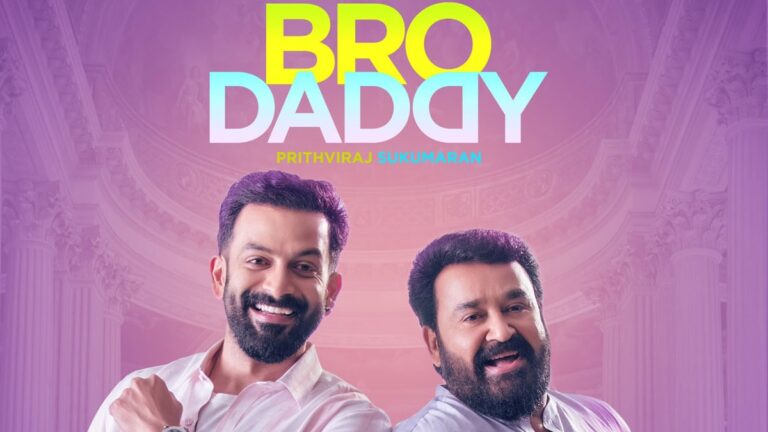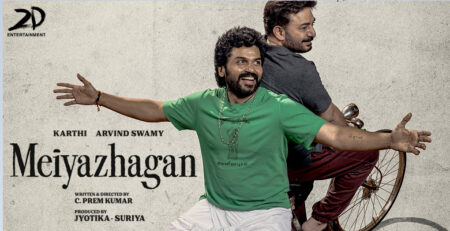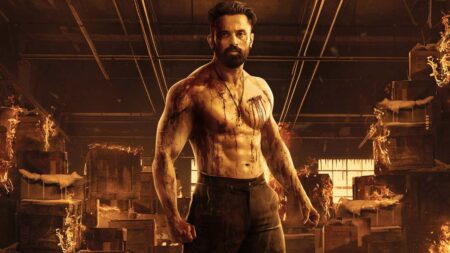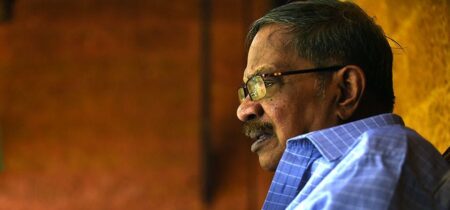In this ‘family film’, any other larger social formations or establishments are out of the question. Bro Daddy ends up playing to the patriarchal gallery.
Disclaimer: This analysis contains spoilers.
Whenever actors from two generations come together in Malayalam, or when younger stars are featured along with any of the two erstwhile super stars, interesting subtexts come alive in, from and through the film narratives in question. Certain sneaky references, random slips or underlying (sometimes deliberate) motifs enter the narrative. They may not have any apparent function in or fit into logic of the narrative, but they almost always resonate with the anxieties or tensions of/in the ‘generation gap’ between male stars.
For instance, why does Eesho (played by Prithviraj who is also the director of the film) suffer from hemophobia? There are two occasions in the film when he blacks out at the sight of blood. Symbolically, blood has been associated with polarities such as life/death, death/birth, sacrifice/murder, mortality/eternal life, sickness/revival, noble/low descent, proof of trust/ object of disgust, etc.
In Bro Daddy, what has this fear of blood to do with the larger narrative? Is it just a random embellishment to the character of Eesho, who is in fact afraid of his own blood (or lineage) at both sides of the generation? He fears the patriarchal authority of his Father (who also happens to be the superstar) and also the unexpected to-be-born child that he fathers premaritally (so without his father’s consent).
In the context of generational splits and bonds within the film industry, blood does have certain interesting resonances. When Prithviraj, arguably the most eligible contender for the post of super star of his generation, casts Mohanlal, the super star of the previous generation in his own movie, there is always an undercurrent of intergenerational dialogue. Is it an acknowledgment or tribute? An accommodation or reverse adoption? A narrative ruse or a marketing strategy?
Taming of the son
Anyways, the macho, all-powerful patriarchal Fathers always have an eerie presence in the ‘newgen’ films. More than reverence and respect, the Father is feared and demands complete surrender and obedience from the male offspring. In the Father’s presence, the sons cower and hide or nurse secret patricidal desires. The sons are either impotent or castrated, and they are often caught between the fiery wrath of the Father and their own sexual desires.
In Bro Daddy too, the Father writes the script of his son’s life, and directs the story to a happy end. In a way, it is about reconciliation between generations; but not through a face to face confrontation. The whole narrative is about the devious ways and means, through which the son tries to hide and cheat his father, and later both of them coming together to play a similar charade with the rest of the players, and especially with another father figure, the father of the bride.
But how do the masculinities of two generations compare with regard to their self-assurance, commitment to one’s ideals, own mate, and the family? In Bro Daddy, billed a ‘family film’, any other larger social formations or establishments are out of the question, as everything happens within the bubbles of two rich families. That too, the families of entrepreneurs who have made it in life, and whose offspring have only to fall in with the family line, rather than explore their own personal desires or professional choices elsewhere.
At the end, Bro Daddy has the son — who strayed and wanted to move out, and pursue a profession and life of his own — tamely comes back home, to continue the family business, which no wonder, turns out also to be his ‘dowry’. Obviously, the girl, his bride, too has to follow suit. The patriarchal families are so insular, closed and ‘complete’ that it is even totally oblivious of the pre-marital family life of their offspring, that too, not in some faraway foreign land, but very near to them, in a neighbouring state.
Papa power
Significantly, the Father (the older star) remains productive even at his age; he also happily welcomes and accepts his wife’s late pregnancy, going ahead with it without a thought about abortion or fear of social stigma. But in the case of the son, it is all ambivalence, self-doubt, fear and hiding. At first, he tries to coax his love Anna (significantly, it is also his mother’s name) to abort the child, and when she refuses, he tries to hide it, and only accepts it when he is forced to the wall.
Though Anna remains firm in her resolve with regard to her pregnancy, as the narrative progresses, she too is drawn into the vortex of familial pressures of status, pride and ego, and becomes a pawn in the male game. Obviously, the sacred duty of both the Annas is to get pregnant, and their role ends there. The rest of the story will be directed and led by the males.
In Bro Daddy, the whole issue of premarital and late pregnancy, the family and marriage drama that follows, are triggered by male plans and strategies, developed by male moves and confrontations, and resolved through male sparring and negotiation. (It is an un-demolishable family held upright by the strength of TMT steel male pillars!) And the propagation and protection of male lineage is predominant in all the families: Kurian’s business lineage is handed over to Eesho; note that Kurian has only a daughter. As he was once a lover of senior Anna, Eesho can also be his surrogate son.
John expands his family through the pregnancies and his son’s marriage. Even in the case of the doctor-friend (Samuel) who runs the hospital chain, of which Kurian is the advertising agent, the expanding business is being taken over by his son-in-law. The domains the three fathers preside over; construction (of homes and families, of course), reproduction (expanding into a national hospital chain) and publicity, says it all. So, the assertive celebration of male lineages and macho machinations continue unabated, which once again debunk any hopes, if at all, about a more gender-sensitive movie culture in Malayalam.
All that glitters
Shot in the brightly lit and colourfully designed interiors of rich homes of the two families, it is all glossy walls, artefacts, modish furniture, shining porcelain, and state-of-the-art gadgets: John at his factory office and Anna at home eating lunch chatting over their tablets! Apart from homes, it is the equally well-furnished home of the live-in couple in Bangalore, some star hotels, and finally the high-end hospital where part of the pregnancy drama (and also Eesho’s future advertisement career) unfolds.
This world in Bro Daddy is devoid of all the griefs and sufferings of life or the world. Common sufferings of humanity like poverty, disease, ageing and death do not enter this space, which is an eternal paradise of youth: no wonder even the aged remain eternally young, productive and potent! In this bright, ‘age-less’ world, there can only be reconcilable misunderstandings and reversible mistakes, never fatal conflicts or violent enmities.
The tagline for the advertisement campaign that Eesho proposes to win the favours of his father-in-law reads like this: ‘every time a child is born, a parent too is born’. True, but the elder parent (the always already Father) here is age-less, and one who infantilizes his son all over again.
When the Annas eventually give birth, John will have a son and a grandson, thus widening and deepening his lineage, while Eesho will have a brother as competitor and a son to look after! Only hope for him is for his Fathers to remain age-less, forever, caring for him and directing his life and career, weaning him away from mistakes and guiding him to the right path.
It seems, finally in Bro Daddy Esho comes to recognise his blood, as to where he belongs and which future he is bound to; thus coming to terms with his hemophobia too!




